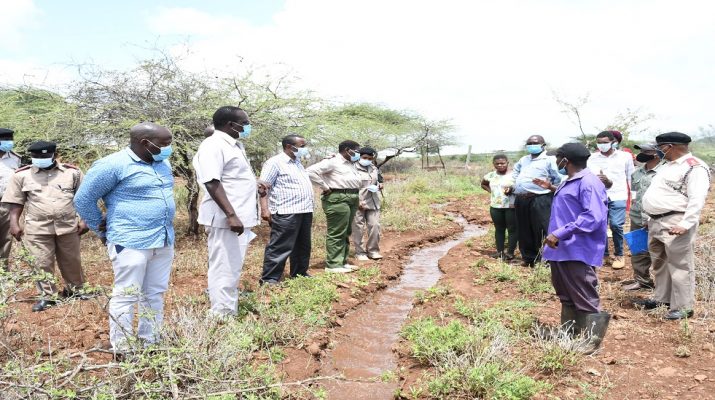Farmers in Nakuruto and Challa areas of Taita Taveta County are a happy lot following the completion of the first phase of an irrigation scheme in the region by the Coast Development Authority (CDA).
At least 100 smallholder farmers are set to benefit from the first phase of the project championed by the CDA in the region to boost agricultural productivity and improve food security.
Peter Maga, a farmer’s representative says that hitherto the dry season often brought agricultural activities in the area close to the border with Tanzania to a standstill.
Maga says farmers were unable to cultivate their land without ‘rainfall and access to irrigation’ something that severely affected their livelihoods.
He says with the completion of the first phase of the public irrigation project, local farmers would now be able to grow crops all year round with the potential to change their lives.
The farmer’s representative says the irrigation scheme will in the long run provide the local farmers who were hitherto dependent on rain-fed agriculture with means to fight poverty.
Another farmer, Jimmy Muchiri said the proposed crops to be grown in the project include bananas, maize, beans, cabbage and pepper and horticultural crops such as tomatoes, onions and kales.
Farmer Muchiri noted that the project is expected to improve cropping intensity, generate income, improve nutrition in the community and create employment.
CDA Managing Director (MD), Dr. Mohamed Keinan says the regional authority carried out a feasibility study for Lake Challa Water Resources Integrated Development Project in 2012 through a consultant.
Dr. Keinan said the project is aimed at utilizing the Lake Challa water resource to supply water for domestic and irrigation use for the benefit of the residents of Taveta, Mwatate and Voi areas and supply water to support livestock, fisheries and forestry including wildlife at the Tsavo national park.
He said the project will go a long way in improving the lives of smallholder farmers and reduce vulnerability in the catchment area.
Lake Challa, a volcanic crater that covers 4.5 square kilometers is a trans-boundary freshwater lake on the Kenya-Tanzania border.
Dr. Keinan noted that due to the high cost of implementation of the Sh. 3.3 billion 1,000 hectare project at the time of study the irrigation scheme was to be implemented in three main phases.
He said so far the total project cost for the first phase is estimated at Sh.45 million mobilized and secured from the National Treasury.
“Besides the smallholder farmers, the project is undertaking domestic water supply to 7,000 people and 15,000 livestock,” he said adding that CDA seeks to spur socio-economic development, promotion of value addition and environmental sustainability.
Dr. Keinan says his authority is undertaking several irrigation projects designed as a ‘ladder out of poverty’ for the smallholder farmers in areas endowed with sufficient water resources for irrigation-based intensification.
He said the overall objective of the projects is to increase food security, improve nutrition, boost farmers’ income and contribute to employment opportunities especially at the farm level.
He said the CDA continues to reposition its socio-economic activities as it seeks to achieve the Big Four Agenda of food security, health care, housing and manufacturing as outlined by President Uhuru Kenyatta.
“The Lake Chala irrigation scheme will ensure the prosperity of the people of Taita Taveta and fulfill the vision of the President in terms of the big four development agenda,” he said.
Dr. Keinan says development projects in the coastal counties of Mombasa, Kilifi, Kwale, Lamu, Taita Taveta and Tana River are being aligned with the government’s agenda of food security, health care, housing and manufacturing.
The CDA MD spoke when he took the Coast Regional Commissioner (RC) John Elungata and Taita Taveta County Commissioner Rhoda Onyancha on a tour of the project.
Elungata urged the CDA to train the beneficiaries of the irrigation project on the best farming practices so as to fully benefit from the project by growing ‘diverse high-value crops’.
He said the growth of diverse, high-value crops will in the long run increase on-farm profitability, value-added processing opportunities, business attraction and employment.
He said the government will ensure that farmers have access to irrigation infrastructure to mitigate the negative effects of climate change and lessen the dependence on rain-fed agriculture.

